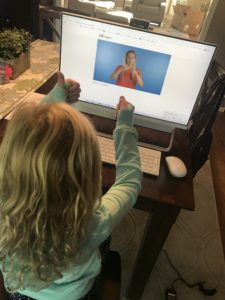Playing with Words: At-Home Edition

This school year has required parents, grandparents, and caregivers to be actively involved in day-to-day schoolwork as instruction has shifted and remote learning, and hybrid instruction have become the new normal. Very often instruction that used to take place live and in person is now happening through online platforms in both synchronous and asynchronous formats.
Something that may be new to parents are phonological and phonemic awareness activities. These oral and auditory word games lay the foundation for reading, even though students are not reading print during the lesson. You may find yourself unknowingly working with phonological awareness skills when you say things like, “Timothy begins with the /t/ sound.” Or when you read books with rhyming words and after repeated readings, your child supplies the rhyming word. Intentional instruction in activities like these is an important skill for early reading development.
“Phonological awareness (PA) involves a continuum of skills that develop over time and that are crucial for reading and spelling success, because they are central to learning to decode and spell printed words. Phonological awareness is especially important at the earliest stages of reading development — in pre-school, kindergarten, and first grade for typical readers.” (Reading Rockets)
Phonemic awareness is defined as the understanding that spoken words are made up of individual sounds called phonemes.
The Heggerty Phonemic Awareness lessons provide systematic instruction with 8 oral and auditory skills in each lesson, and the words used in each activity are not shown in print. The activities develop a child’s awareness of sounds, leading to phonemic proficiency. Each daily lesson includes activities for rhyme, isolating sounds, blending, segmenting, and manipulating sounds through adding, deleting and substituting with spoken words. Essentially, these are word games that are fun and engaging to play.
In order to support teachers and students working in new learning environments this school year, the literacy specialists from Heggerty created Daily Lesson Videos, and your child may be viewing these videos as part of their literacy instruction. While phonemic awareness instruction is best taught live and in-person, the videos were recorded for your child to engage in the daily lessons during remote learning. Below are a few tips and suggestions for using the lessons at home:
- Encourage your child to use his/her
 voice along with the video and respond aloud for each wordand activity.
voice along with the video and respond aloud for each wordand activity. - If you notice your child is having difficulty with a skill, stop, rewind, and practice the words again. You can work alongside your child with the activities and model for them what the correct response should be. We tried to anticipate learning that would be new for students and we provided examples in the videos.
- Encourage your child to use the hand motions that are shown in the videos. For example, show thumbs up when 2 words rhyme or have them punch their arm up in the air when they isolate the final sound, matching what they see on the video.
Even though your child is not reading or writing during the lesson, these skills transfer to print when your child reads or sounds out words, and even when your child wants to write and spell words on their own. The segmenting activity from Heggerty (when we chop a word into parts or sounds) can be used to help your child write and spell; ask your child to say all the sounds he/she hears in a word and then write the letter that matches each sound.
For example, bat, /b/ - /a/ - /t/; your child chops the word into three sounds and then he/she writes a letter to match each sound. You can prompt by saying, “What letter says /b/?” Or you can draw a line on the paper for each sound you hear, so your child can write a letter on each line, spelling the whole word.
How can you use phonemic awareness word games at home?
Phonological awareness is simple to support at home - all you need is language! These activities or word games can extend beyond the classroom lesson, and can be a lot of fun.
- You can ask your child to isolate the first sound in people’s names, or ask your child to think of words that begin with the same sound as their name. (i.e. Sam, /ssss/, Sam. What other words begin with /s/ like Sam? Possible responses: silver, star, sun, same, sort, sick, see, etc)
- Can your child segment or chop a big word into syllables? Do you have a long last name that they can chop into syllables? (i.e. understand, un-der-stand or picnic, pic-nic) Remember, these words are spoken aloud, not seen in print.
- Can they delete the first sound from their name and say what is left? (i.e. Mark, without /m/, what’s left is? Answer: -ark)
- When I say 3 sounds, /d-o-g/, what’s the word? (dog) Try this with other simple words that have 2 or 3 sounds (toe, cat, sock).
- What happens if I change the first sound /b/ in bake to /l/? The word is lake.
Because these activities are spoken aloud, they require no preparation and can take place anywhere! You may find this is a fun way to pass time in the car, swinging on the swings at the park, or when you are outside on a walk.
Reading Books with Word Play
Picture books are great resources for word games and hearing words that rhyme. When reading with your child, ask him/her to tell you the rhyming words they hear. If you have read a book more than once, ask your child to supply the rhyming word at the end of a sentence. Have you read any of these favorites with your little learner?
Rhyming Dust Bunnies by Jan Thomas
Is Your Mama a Llama? By Deborah Guarino
Chicka Chick Boom Boom by Bill Martin Jr and Lois Ehlert
Twinkle, Twinkle Little Star by Iza Trapani
Rhyme Crime by Jon Burgerman
Dog on a Frog? By Kes & Claire Gray and Jim Field
Barnyard Hullabaloo by Giles Andreae & David Wojtowycz
Llama Llama Red Pajama by Anne Dewdney
Coming Soon
We here at Heggerty want to continue to support parents when working with their children at home. Coming in June, we will be sharing Parent Newsletters that can be used to reinforce the lessons that are taking place in the classrooms. It is our hope that teachers will share these with parents and caregivers, as students progress with each skill and activity throughout the school year. Parents are welcome to find them directly on our website and access the activities themselves too. The newsletters will be available as a free printable resource, providing a home-school connection for our English and Spanish curricula.
A Spanish version of this information letter for parents would be very helpful
Hi Andy! I wanted to share a link to our parent newsletters, they are available in English and Spanish, you can view those here: https://heggerty.org/downloads/#resource-categories-6